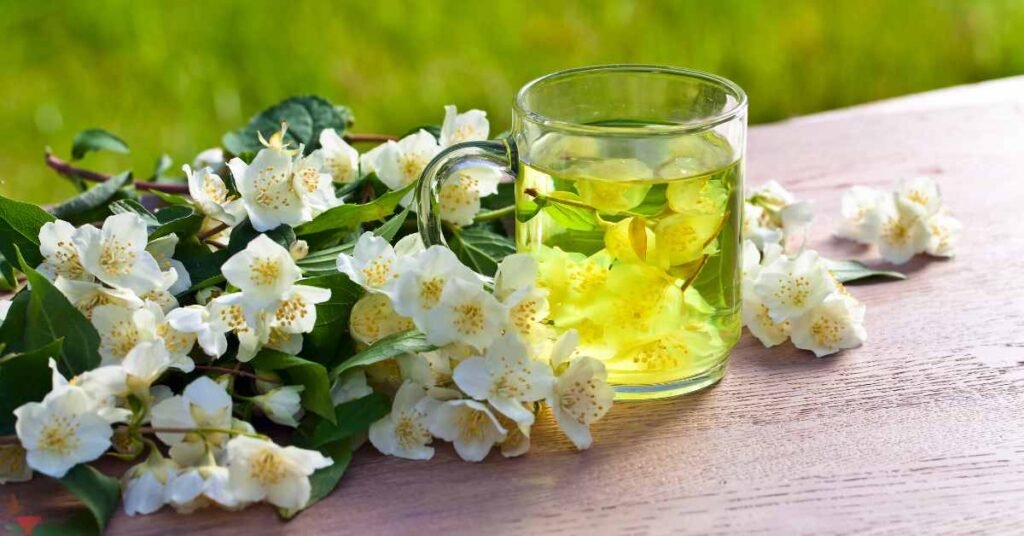Jasmine tea, known for its fragrant aroma and delicate taste, has been a favorite among tea lovers for centuries.
However, not all jasmine teas are created equal.
To ensure you are enjoying the best quality, it is essential to know what to look for when selecting jasmine tea.
Here are some key factors to help you identify high-quality jasmine tea:
1. Aroma

The hallmark of jasmine tea is its captivating aroma.
High-quality jasmine tea should have a strong, natural jasmine fragrance that is both refreshing and uplifting.
The scent should not be overpowering or artificial. If the aroma is weak, overly perfumed, or chemically induced, it may indicate a lower quality tea.
2. Appearance
High-quality jasmine tea leaves should be visually appealing. Look for:
- Whole Leaves: The tea should consist of whole, unbroken leaves rather than tea dust or fannings.
- Color: The leaves should have a vibrant green hue, indicating they are fresh and properly processed. Avoid leaves that are too dark or dull, as this can signify poor quality or old tea.
- Bud Presence: The inclusion of tea buds along with the leaves is a sign of premium quality. Buds add a sweetness and complexity to the flavor.
3. Taste
The taste of high-quality jasmine tea should be well-balanced, with a harmonious blend of the base tea and the jasmine flowers. When brewed:
- Smoothness: The tea should be smooth and not overly astringent or bitter.
- Sweetness: There should be a natural sweetness from the jasmine flowers, complementing the tea’s flavor.
- Freshness: The tea should taste fresh and clean, without any stale or musty notes.
4. Origin

The origin of the jasmine tea can also be an indicator of its quality. The most renowned jasmine tea comes from:
- China: Specifically, the Fujian province is known for producing some of the best jasmine teas in the world, including Jasmine Dragon Pearl (Mo Li Long Zhu) and Jasmine Silver Needle (Mo Li Yin Zhen).
5. Scenting Process
High-quality jasmine tea undergoes a meticulous scenting process.
Traditional methods involve layering fresh jasmine flowers with tea leaves overnight, allowing the tea to absorb the floral aroma.
This process can be repeated multiple times, depending on the desired intensity.
Lower quality jasmine tea may use artificial flavoring or fewer scenting cycles, resulting in a less authentic flavor.
6. Leaf Quality
Examine the tea leaves closely:
- Hand-rolled: High-quality jasmine tea leaves are often hand-rolled into pearls or needles. This method preserves the integrity of the leaves and ensures even scenting.
- Uniformity: The leaves should be uniform in size and shape, indicating careful selection and processing.
7. Packaging
Proper packaging is crucial for preserving the quality of jasmine tea:
- Airtight: The tea should be stored in airtight containers to prevent exposure to moisture, light, and air, which can degrade the flavor and aroma.
- Opaque: Packaging should be opaque to protect the tea from light, which can cause the leaves to deteriorate.
8. Infusion

Observe the tea as it brews:
- Clear Liquor: High-quality jasmine tea will produce a clear, bright liquor without cloudiness.
- Consistent Flavor: The flavor should remain consistent over multiple infusions, with the jasmine aroma and taste enduring through several brews.
9. Price
While not always an absolute indicator, price can often reflect the quality of jasmine tea.
High-quality jasmine tea typically costs more due to the labor-intensive scenting process and the use of premium leaves and flowers.
Be cautious of unusually cheap jasmine tea, as it may compromise on quality.
Final Word
Identifying high-quality jasmine tea involves paying attention to the aroma, appearance, taste, origin, scenting process, leaf quality, packaging, infusion, and price
By carefully considering these factors, you can ensure that you are selecting and enjoying the finest jasmine tea available, providing a truly delightful and aromatic experience.
MEDICAL DISCLAIMER
Itsnevernotteatime.com cannot and does not contain medical/health advice. The medical/health information is provided for general and educational purposes only and is not a substitute for professional advice.




